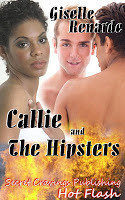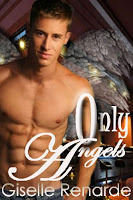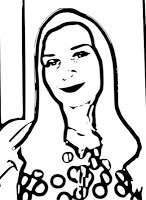I'm Not 18 Anymore
I read a great post on called About "Barely Legal" on Emily Veinglory's site the other day, and found myself commenting so vigorously I decided to expand my thoughts into a blog post of my own.
In brief recapitulation, Emily reports that,
She points out that all commentary around this issue of the "barely legal" teen is focused on the male gaze/male readership. Thus, as usual, the female gaze/readership is placed under erasure. Women don't like sex anyway. And even if we do read erotica, it's not like we're going to get so horny reading it that we go out and seduce the first pretty young thing we see walking down the street. (That's what men do, right?)
Women don't like sex anyway. And even if we do read erotica, it's not like we're going to get so horny reading it that we go out and seduce the first pretty young thing we see walking down the street. (That's what men do, right?)
Le sigh.
The "barely legal" discussion quickly extended to encompass that of younger/older relationships, and I have so damn much personal experience in that domain I couldn't help sharing. Some would say I'm the epitome of TMI, but I think sharing experiences is vitally important and saves us from isolation and all its emotional repercussions.
After reading Emily's thoughts, along with those of commenters who expressed enjoyment of stories in which one or more characters fell into that "barely legal" range, here's what I wrote:
At that point I cut myself off ("I think you've had enough, Giselle") because there's only so much people are going to read in a comment box.
But here's the other matter I wanted to throw into the ring:
 When I write about younger/older relationships, as I very often do, I put myself and my experiences very much into the younger character. I ALSO infuse the older character with aspects of my personality. Hate to get all Jungian on you (no, actually I love it), but writing fiction is a lot like dream analysis: everyone is YOU.
When I write about younger/older relationships, as I very often do, I put myself and my experiences very much into the younger character. I ALSO infuse the older character with aspects of my personality. Hate to get all Jungian on you (no, actually I love it), but writing fiction is a lot like dream analysis: everyone is YOU.
Same goes with reading: if you don't identify with both/all partners (and the quirky best friend and the man with six fingers), you're probably not going to finish the book. As authors, we inject ourselves into all of our characters, to some degree. As readers, we see ourselves in all those characters, to some degree. Even if we hate them. Because we ALL have aspects of ourselves we can't stand.
Now, I hope nobody reading this post will imagine I'm jumping up in defense of matters not explicitly stated here. I do not condone depictions of child sexual abuse. Many of my friends are survivors of unimaginable atrocities, and the idea of others finding the crimes committed against them titillating? That makes me sick.
And, yes, I have read works were it seemed like the magic age of 18 was slapped on a young girl whose character traits, behaviours, and parlance made her seem 12 or 13, and 15 at best. I'll be honest with you: that makes me feel icky. Yes, it's a slippery slope. I agree. But, you know what? Eighteen is legal in life. Why is it suddenly problematic on paper?
I want to close by returning to the first set of ideas I introduced in this post, about how so many of us station ourselves within that first year of adulthood, the age of 18, and remain there enduringly.
Why? Because when we look back on that era, especially from a distance, all we remember is how wonderful it felt to be young and in love, or young and in lust. Any 18-year-old can tell you it ain't pretty, but by the time you hit your mid-20's, you've forgotten all about your anger, your anguish, and your fights with your mother about how you're an adult now and you can do what you want.
My sense is that most of us read and write fiction involving young adults in response to a sort of nostalgic hyperreality. We possess this deep-seated longing to return to those halcyon days that never actually existed the way we remember them. We want what we don't realize we never had.
And now we're as branded obscene for wanting to remember.
 Hugs, Giselle
Hugs, Giselle
--Giselle Renarde Canada just got hotter!
Visit me online http://donutsdesires.blogspot.comhttp://www.wix.com/gisellerenarde/eroticahttp://twitter.com/GiselleRenardeGiselle Renarde
Canada just got hotter!
http://www.wix.com/gisellerenarde/ero...
In brief recapitulation, Emily reports that,
One of the issues pushed to the surface by the ARe/Bookstrand reactions to taboo erotica is 'barely legal' erotica. I have seen reaction ranging from 'legal is legal so who cares' to 'it's basically child abuse'.
She points out that all commentary around this issue of the "barely legal" teen is focused on the male gaze/male readership. Thus, as usual, the female gaze/readership is placed under erasure.
 Women don't like sex anyway. And even if we do read erotica, it's not like we're going to get so horny reading it that we go out and seduce the first pretty young thing we see walking down the street. (That's what men do, right?)
Women don't like sex anyway. And even if we do read erotica, it's not like we're going to get so horny reading it that we go out and seduce the first pretty young thing we see walking down the street. (That's what men do, right?)Le sigh.
The "barely legal" discussion quickly extended to encompass that of younger/older relationships, and I have so damn much personal experience in that domain I couldn't help sharing. Some would say I'm the epitome of TMI, but I think sharing experiences is vitally important and saves us from isolation and all its emotional repercussions.
After reading Emily's thoughts, along with those of commenters who expressed enjoyment of stories in which one or more characters fell into that "barely legal" range, here's what I wrote:
Every time I fill out a form that asks for demographic information, guess which age box I tick? 18-24. And sometimes it takes a few minutes until I realize... crap... it's almost a decade since I could even squeak into that age bracket.I forget my age. I DRASTICALLY misjudge it.
When I was 19, I was involved in an adulterous relationship with a 50-year old man. That 10-year affair is the basis of my book "Audrey & Lawrence." One thing he always used to say (which I never understood until now) was that every time he looked in the mirror, he expected to see an 18-year-old looking back. He never adjusted to his age.
I get that now--big time.
I'm a queer woman with an inclusive preference for women. My girlfriend of 4 years is older than I am. Now, in my thirties, I still have a preference for an older PARTNER while retaining a long-held attraction to young women. (At this point, it takes a very special man to turn my head.)
I'm talking about real life rather than fiction, I realize, but as an author my tastes obviously impact my work. I've just finished a manuscript I absolutely love. Itinvolves some pretty extreme lesbian age play. Although the younger character is 20, I'm increasingly concerned that the backlash against acknowledging young WOMEN (18- and 19-year-olds are adult women, after all) will soon impact any text that views age in consensual adult pairings as a plaything.
I know from my own experiences in relationships with older partners that downplaying an age difference, particularly when it's a difference of over thirty years as in the case of my long-term affair, was akin to burying our heads in the sand. Acknowledging the power imbalance and other such dynamics of a younger/older partnership is the best way to approach that kind of relationship.
At that point I cut myself off ("I think you've had enough, Giselle") because there's only so much people are going to read in a comment box.
But here's the other matter I wanted to throw into the ring:
 When I write about younger/older relationships, as I very often do, I put myself and my experiences very much into the younger character. I ALSO infuse the older character with aspects of my personality. Hate to get all Jungian on you (no, actually I love it), but writing fiction is a lot like dream analysis: everyone is YOU.
When I write about younger/older relationships, as I very often do, I put myself and my experiences very much into the younger character. I ALSO infuse the older character with aspects of my personality. Hate to get all Jungian on you (no, actually I love it), but writing fiction is a lot like dream analysis: everyone is YOU. Same goes with reading: if you don't identify with both/all partners (and the quirky best friend and the man with six fingers), you're probably not going to finish the book. As authors, we inject ourselves into all of our characters, to some degree. As readers, we see ourselves in all those characters, to some degree. Even if we hate them. Because we ALL have aspects of ourselves we can't stand.
Now, I hope nobody reading this post will imagine I'm jumping up in defense of matters not explicitly stated here. I do not condone depictions of child sexual abuse. Many of my friends are survivors of unimaginable atrocities, and the idea of others finding the crimes committed against them titillating? That makes me sick.
And, yes, I have read works were it seemed like the magic age of 18 was slapped on a young girl whose character traits, behaviours, and parlance made her seem 12 or 13, and 15 at best. I'll be honest with you: that makes me feel icky. Yes, it's a slippery slope. I agree. But, you know what? Eighteen is legal in life. Why is it suddenly problematic on paper?
I want to close by returning to the first set of ideas I introduced in this post, about how so many of us station ourselves within that first year of adulthood, the age of 18, and remain there enduringly.
Why? Because when we look back on that era, especially from a distance, all we remember is how wonderful it felt to be young and in love, or young and in lust. Any 18-year-old can tell you it ain't pretty, but by the time you hit your mid-20's, you've forgotten all about your anger, your anguish, and your fights with your mother about how you're an adult now and you can do what you want.
My sense is that most of us read and write fiction involving young adults in response to a sort of nostalgic hyperreality. We possess this deep-seated longing to return to those halcyon days that never actually existed the way we remember them. We want what we don't realize we never had.
And now we're as branded obscene for wanting to remember.
 Hugs, Giselle
Hugs, Giselle--Giselle Renarde Canada just got hotter!
Visit me online http://donutsdesires.blogspot.comhttp://www.wix.com/gisellerenarde/eroticahttp://twitter.com/GiselleRenardeGiselle Renarde
Canada just got hotter!
http://www.wix.com/gisellerenarde/ero...
Published on February 24, 2012 11:33
No comments have been added yet.



